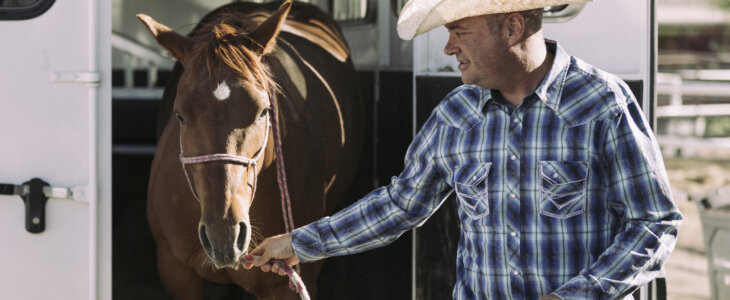In the equine industry, the safe and efficient transportation of horses is not just a matter of convenience – it’s a critical component of your business’s success and your horses’ well-being. Whether you’re a professional trainer preparing for a major competition, a breeder sending valuable horses to new owners, or a passionate equestrian embarking on a cross-country adventure, you need to know that your horses are in capable hands every step of the way.
However, the process of transporting horses is not without its risks and challenges. You need to take several factors into account to safeguard the health and safety of your animals during transit. A single mistake or oversight could lead to devastating financial and emotional consequences.
The experienced equine law attorneys at Gueronniere, P.A., understand the unique demands and challenges of Florida’s horse industry. We can draft and review equine transportation agreements that protect your interests, your investment, and your animals. Contact us today to set up a consultation to discuss your situation.
The Importance of Equine Transportation Agreements
Equine transportation agreements are legal contracts that outline the terms and conditions under which a horse will be transported from one location to another. These agreements are essential for several reasons.
First, they establish clear expectations and responsibilities for all parties involved in the transportation process, including the horse owner, transporter, and any other relevant parties. These agreements delineate each party’s specific duties and obligations, such as the conditions under which the horse will be transported, the care that the horse will receive during transit, and the timeframe for transportation. By clearly outlining these details, the agreements help minimize the risk of disputes or misunderstandings arising during transportation.
Additionally, equine transportation agreements provide a legal framework for holding parties accountable if something goes wrong during transportation, such as injury to the horse or damage to property. For instance, the agreement can specify who is liable for veterinary expenses or other associated costs if a horse is injured during transport. This accountability is crucial for ensuring that the horse’s welfare is prioritized and that any issues are addressed promptly and fairly.
Finally, these agreements can help to limit liability and protect the financial interests of all parties involved. By clearly stating the insurance requirements and coverage details, the agreements ensure that both the horse owner and transporter are adequately protected in case of accidents or unforeseen incidents. This protection safeguards against significant financial losses that could arise from accidents or injuries.
What Should Be Included in an Equine Transportation Agreement?
A comprehensive equine transportation agreement should address a wide range of issues related to the transportation process. Some of the key elements that should be included in any equine transportation agreement are:
- Identification of the Parties – Clearly identify all parties involved in the transportation process, including the horse owner, transporter, and any other relevant parties.
- Description of the Horse – Provide a detailed description of the horse being transported, including its name, age, physical dimensions, breed, color, and any distinguishing marks or characteristics.
- Transportation Details – Specify the details of the transportation process, including the pickup and delivery locations, dates and times, and any stops or layovers along the way.
- Transportation Method – Clearly state the method of transportation that will be used, such as a horse trailer, van, or airplane.
- Responsibilities of the Parties – Outline the responsibilities of each party involved in the transportation process, including the horse owner, transporter, and any other relevant parties.
- Liability and Insurance – Address issues related to liability and insurance, including who is responsible for any injuries or damage that may occur during transportation and what types of insurance coverage are required.
- Payment Terms – Specify the payment terms for the transportation services, including the total cost, payment schedule, and any deposits or fees required.
- Termination and Dispute Resolution – Include provisions for terminating the contract and resolving any disputes that may arise during the transportation process.
Why You Need an Equine Law Attorney to Draft Your Equine Transportation Agreement
Your equine transportation agreement must provide both legal protection and peace of mind. When it comes time to draft a new agreement or update an existing one, a knowledgeable equine law attorney can make sure it comprehensively addresses all legal concerns related to the transportation and care of your horse. These attorneys have a detailed understanding of equine law and can tailor the agreement to address specific needs and potential risks, such as liability issues, insurance requirements, and compliance with state and federal regulations.
Working with an equine law attorney will protect the interests of all parties involved, ensure the contract is legally enforceable, and anticipate and mitigate potential disputes.
Contact Our Wellington Equine Law Attorney Today
When you’re preparing for a trip that involves your horse, you likely have a lot of things on your mind. The protection of your horses doesn’t have to be one of them. An equine law attorney can draft an equine transportation agreement that meets your needs, safeguards your interests, protects your horses, and provides the peace of mind you deserve.
When it comes to equine law, experience matters. At Gueronniere, P.A., our lead attorney, Grace de la Gueronniere, is not only an equine law attorney with more than a decade of experience but also a lifelong equestrian herself. She understands the unique challenges and opportunities facing those in Florida’s equine industry and brings that knowledge and passion to every case she handles. Our firm recognizes the concerns horse owners experience when it comes to the safety and security of their animals, and we’re here to provide the robust legal support you need.
Contact our Wellington office today for a consultation to discuss your equine transportation agreement or any other legal concerns you may have.
